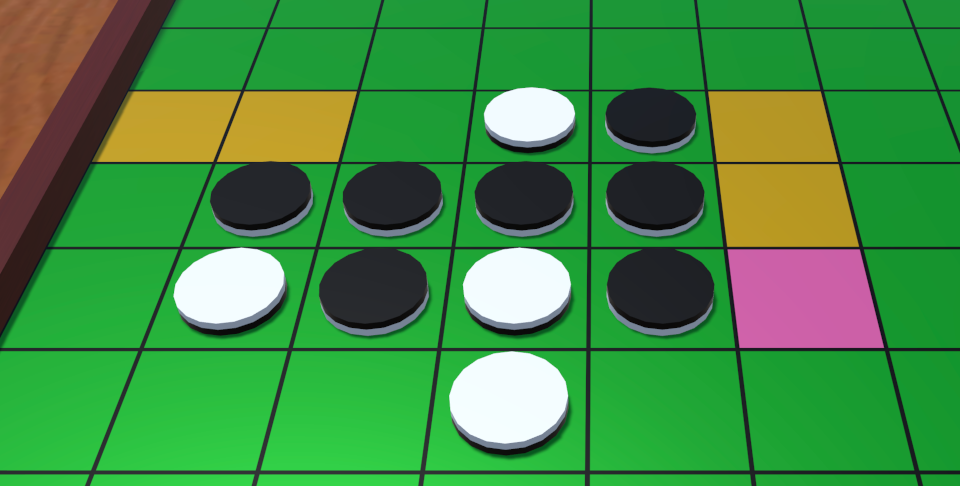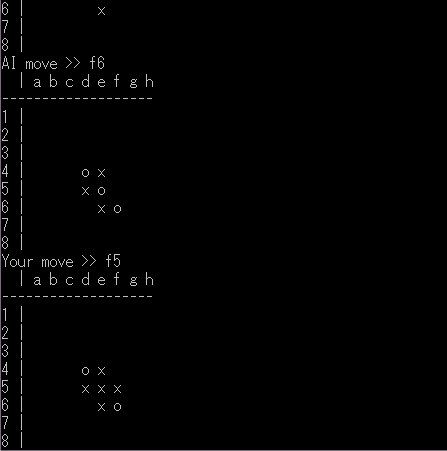Heuristic Reversi AI implemented as a Windows native DLL
This AI uses heuristic algorithms to determine the most effective move in any given scenario within a game of Reversi, also known as Othello. It is designed with efficiency, speed, and complexity in mind, capable of making intricate decisions based on the current state of the game board.
A ported version of this project is also available in Rust: https://github.com/curegit/reversi-ai.
- Simple API
- Callable from C# easily
- Multithread supported
- Moderate AI Strength
You may need Microsoft Visual C++ Redistributable.
- KERNEL32.dll
- MSVCP140.dll
- VCRUNTIME140.dll
- api-ms-win-crt-heap-l1-1-0.dll
- api-ms-win-crt-runtime-l1-1-0.dll
The DLL has simple API. For instance, a board state is given, the API function returns a move you should choose next.
Bit Board is expression of a Reversi board.
By Bit Board, a board state is expressed by a pair of 64-bit unsigned integers.
They each have bit flags where each players' disks are placed.
For example, an initial board of Reversi is expressed like 0x0000_0008_1000_0000 and 0x0000_0010_0800_0000.
Returns an approximately good move that self player should do next by doing a partial search.
self and opponent are Bit Board.
depth is anticipation steps the same as the depth of recursion.
It must be positive.
The returned value is a bit number expressing a disk position.
The bit number is 0 to 63.
Search time depends on the depth of recursion.
The multithreaded version of heuristic_search.
It's faster than the non-multithreaded version in most cases if the CPU is good enough for parallel calculation.
int heuristic_search_parallel_with(unsigned long long self, unsigned long long opponent, int depth, int concurrency)
Same as heuristic_search_parallel except you can specify the number of threads.
Returns the best move that self player should do next by doing a full search.
This can be used if the game is in its final stages.
self and opponent are Bit Board.
The returned value is a bit number expressing a disk position.
The bit number is 0 to 63.
The multithreaded version of full_search.
It's faster than the non-multithreaded version in most cases if the CPU is good enough for parallel calculation.
int full_search_parallel_with(unsigned long long self, unsigned long long opponent, int concurrency)
Same as full_search_parallel except you can specify the number of threads.
Returns a move that self player should do next.
This function is a wrapper of heuristic_search and full_search.
It switches between them considering search time.
self and opponent are Bit Board.
The returned value is a bit number expressing a disk position.
The bit number is 0 to 63.
Search time will be less than a few seconds usually.
The multithreaded version of choose_move.
Thanks to speeding up by parallel calculation, this function tries to search deeper than the non-multithreaded version. Moreover, it switches to full search earlier. Use this multithreaded version instead to make AI stronger.
int choose_move_parallel_with(unsigned long long self, unsigned long long opponent, int concurrency)
Same as choose_move_parallel except you can specify the number of threads.
Returns a bit number from a horizontal position and a vertical position.
i and j are 0 to 7.
The returned bit number is 0 to 63.
Returns a 64-bit unsigned integer having a one-bit flag at a given board position.
i and j are 0 to 7.
This function can be used to compose a Bit Board from other data types.
Returns a horizontal position from a bit number.
The bit number is 0 to 63. The returned index is 0 to 7. Use this function for the conversion of a bit number as AI result, to a disk position.
Returns a vertical position from a bit number.
The bit number is 0 to 63. The returned index is 0 to 7. Use this function for the conversion of a bit number as AI result, to a disk position.
See all functions (Header file)
Copy each DLL of target architectures into an architecture-specified plugin folder inside of Assets.
- Win32 DLL into
Plugins/x86 - x64 DLL into
Plugins/x86_64
Configure platform settings of the DLLs in Inspector to enable them in Editor for debugging (Windows only).
First, import System.Runtime.InteropServices namespace for calling DLL functions.
using System.Runtime.InteropServices;Next, import external functions from the DLL.
Define static methods with the extern modifier and DllImport("ReversiAiDll") attribute.
Declare them with the same names as DLL functions, or indicate function names to be imported by the EntryPoint parameter of DllImport.
Make sure their type signatures match.
It is not necessary to use the same parameter names.
[DllImport("ReversiAiDll")]
private static extern int index_to_position_i(int n);
[DllImport("ReversiAiDll")]
private static extern int index_to_position_j(int n);
[DllImport("ReversiAiDll")]
private static extern ulong position_to_bit(int i, int j);
[DllImport("ReversiAiDll", EntryPoint = "choose_move_parallel")]
private static extern int ChooseMove(ulong self, ulong opponent);Now these functions are able to be called.
Finally, write codes that call AI functions.
// Prepare Bit Boards from collections of disk positions
ulong self = darkPositions.Aggregate(0ul, (a, p) => a | position_to_bit(p.x, p.y));
ulong opponent = lightPositions.Aggregate(0ul, (a, p) => a | position_to_bit(p.x, p.y));
// Use AI to decide the next move
int decision = ChooseMove(self, opponent);
// Extract answers
int x = index_to_position_i(decision);
int y = index_to_position_j(decision);It takes a few seconds for AI to return an answer, so please use asynchronous methods.
An illustrative Unity application (binary) is available on the release page.
This solution also includes a Windows console application to try on the AI.
ReversiConsole.exe [dark|light]
The positional argument is your side. It is dark by default.

